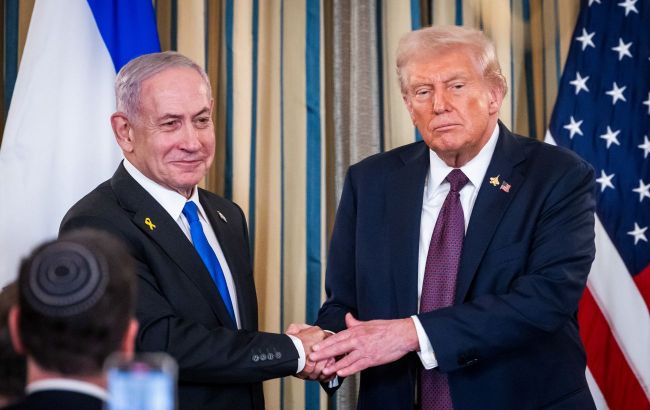Trump's plan for Gaza: Can it end Israel-Hamas war?
 Donald Trump and Benjamin Netanyahu (photo: Getty Images)
Donald Trump and Benjamin Netanyahu (photo: Getty Images)
US President Donald Trump has proposed a new initiative to resolve the conflict in the Gaza Strip.
RBC-Ukraine reports on how Israel and Hamas view the plan and whether there is a chance to finally end the war in the region.
Key questions:
- What is the essence of Trump’s plan?
- How is the plan perceived in Israel?
- Will Hamas agree to the proposal?
A comprehensive approach
For the first time since Hamas militants attacked Israel, a political framework for ending the conflict in the Gaza Strip has emerged. The plan was presented on September 29 during Israeli Prime Minister Benjamin Netanyahu’s visit to Washington.
According to the plan, the Gaza Strip would become a peaceful region, free from terrorism and without posing a threat to neighbors, with the reconstruction of infrastructure such as water and electricity. The IDF would withdraw from some occupied areas. Israel would also release 250 prisoners serving life sentences and 1,700 arrested after October 7, 2023, when militants carried out the largest terrorist attack in the history of Israel. Hamas, in turn, must release all Israeli hostages within 72 hours. Militants would also be offered amnesty or safe passage on the condition of surrendering their weapons.
According to the plan, the Gaza Strip would be temporarily governed by a Palestinian technocratic committee under the supervision of an international Peace Council chaired by Trump and including other world leaders, until a reformed Palestinian Authority takes control of the enclave.
International stabilization forces would also be deployed in Gaza. Working with Israel, Egypt, and Jordan, they would ensure border security, demilitarization, and the destruction of terrorist infrastructure. The plan also includes an economic component: a special economic zone would be established in the Gaza Strip.
According to Serhiy Danylov, deputy director of the Center for Middle East Studies, the plan is a step forward compared to Trump’s previous ideas, such as evacuating the entire population and turning Gaza into a resort.
"This is the most realistic of everything proposed so far. It is the least detailed in terms of what comes next. The main question since the first day of the military operation in Gaza has been how the territory will be administered and how it will be cleared of Hamas," he told RBC-Ukraine.
At the same time, the weakest part of the plan remains the political arrangement of the enclave. However, before moving to this stage, hostilities must stop. And here, in Trump’s terminology, the ball is in Hamas’ court.
Will Hamas accept Trump’s plan
Israel and Hamas have reached agreements before, but they were largely tactical—releasing some hostages in exchange for a temporary halt in fighting and a few other concessions. However, militants repeatedly undermined further implementation. The current situation is different.
"Hamas is not the same as before. They have lost capabilities and, as far as I understand, much of their command and control. Only mobilization reserves remain intact. But now there is a consolidated position among all Arab countries. There is pressure even from Qatar, and an understanding that better conditions will not come," said Danylov.
In addition to the US, leaders of the UK and France have expressed support for the plan. Recently, these countries pressured Israel to limit military actions in the Gaza Strip, including by initiating another wave of recognizing Palestine as a state. However, this had little effect on Israel, as the recognition is largely symbolic.
Foreign ministers from Saudi Arabia, Jordan, the UAE, Indonesia, Pakistan, Türkiye, Qatar, and Egypt also issued a joint statement on this matter.
Hamas is likely to negotiate over certain points of the plan. A source cited by Sky News Arabia said the group has several questions. Hamas asked a Qatari mediator to clarify guarantees for ending the war after the release of Israeli hostages and to provide a clear timetable for the withdrawal of Israeli forces from Gaza. Additionally, Hamas seeks assurances that its leaders abroad will not be targeted.
A source close to Hamas told Reuters that the plan is "completely biased toward Israel" and imposes "impossible conditions" aimed at dismantling the group.
At the same time, an official familiar with the negotiations said Hamas representatives would review the plan and provide a response.
An unnamed Arab diplomat told The Times of Israel that it will be difficult to convince Hamas to accept the US proposal in its current form, as it would force the group to give up all leverage: release all remaining hostages within the first 72 hours of the agreement, while initially allowing only a partial withdrawal of Israeli forces.
The official believes Hamas will likely respond after several days and then try to propose its own amendments, similar to what Netanyahu did.
Opportunities for Israel
Overall, Israel is satisfied with the plan. During his visit to Washington, Netanyahu was able to secure several points beneficial to Israel, The Times of Israel reports. This includes the withdrawal of troops from the Gaza Strip: Israeli forces will be able to remain in parts of the enclave until the international stabilization forces are ready to deploy and carry out a full operation to disarm Hamas. Netanyahu also succeeded in adding a requirement to the amnesty clause for group members to surrender weapons and dismantle military infrastructure.
Among other things, the plan gives Israeli society and the military at least some political perspective on ending the war, Danylov noted.
"I am confident that the General Staff has submitted multiple reports to Israel’s security cabinet emphasizing the urgent need to conclude the conflict, because waging a war without a political plan is very destructive for both the army and the state of Israel itself. No army wants to perform police duties and fight forever," the expert emphasized.
The plan has already been criticized by Netanyahu’s far-right coalition partners, but leaders of the centrist opposition have expressed support and willingness to lend a hand. However, all options remain on the table.
"If Hamas rejects your plan, Mr President, or if they supposedly accept it and then do everything to counter it, then Israel will finish the job by itself. This can be done the easy way or it can be done the hard way, but it will be done," Netanyahu said at a joint press conference with Trump.
However, in such a scenario, Israel would face new challenges in its relations with European countries. The possibility of introducing trade or sanctions measures against Israel has been discussed for months. Nevertheless, this may not be too high a price to pay for eliminating a group that denies Israel’s very right to exist.
Sources: statements from American and Israeli politicians, as well as reports from The Times of Israel, Haaretz, Reuters, and Sky News Arabia.

